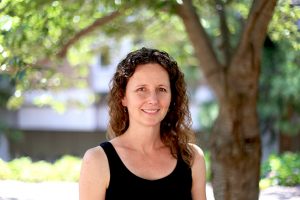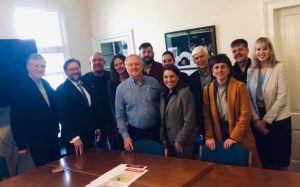English faculty member Hilary Lithgow has led a North Carolina Humanities’ Veterans Reading Group for over five years, building valuable relationships among group participants and reaching across political, social and generational divides.

North Carolina has one of the largest active-duty military and veteran populations in the country. Using literature and story to foster connection, North Carolina Humanities’ Veterans Reading Groups aim to reduce feelings of isolation and provide a context in which to explore issues regarding military service and everyday life. These book groups are led by, and available for, veterans and members of the military community, providing a safe space for open dialogue.
Hilary Lithgow, teaching associate professor in the department of English and comparative literature, has been a co-facilitator of a Chapel Hill-based chapter of North Carolina Humanities’ Veterans Reading Groups for over five years. Lithgow specializes in Victorian and early Modernist British literature as well as literature of war, starting from WWI through present day. Her background, expertise and passion have allowed her and a series of veteran co-facilitators —most recently Army veteran and UNC alum Tyler Stevenson — to nurture a community of close-knit veterans whose bond has extended beyond book discussions.
North Carolina Humanities recently connected with Lithgow to hear how this North Carolina Humanities program has helped a group of veterans navigate and support each other through life’s ups and downs.
Q: What makes Veterans Reading Groups unique, and why are they important?
Lithgow: One thing that makes these groups important is that they allow veterans to better understand their military experience and connect that experience in new ways with their civilian lives. Veterans and civilians alike sometimes see military experience, especially combat experience, as unique and inaccessible to people who don’t share it. There are reasons for people to feel that way, but those feelings can also leave veterans feeling isolated and can contribute to what’s sometimes referred to as the civilian-military divide. Veterans Reading Groups bridge that divide by helping veterans discover, through works of literature, articulations of experiences that, up until that point, they may have felt could not be communicated in words. Phil Klay (a Marine veteran and National Book Award winning author) talked about this power of literature in a 2014 op-ed piece he wrote for The New York Times: “It’s a powerful moment, when you discover a vocabulary exists for something you’d thought incommunicably unique.” In our book group meetings, we have a lot of those moments, and the fact that we have them as a group, shared among veterans but also with me as a civilian, doesn’t just build bridges across the divide, it helps us all realize that maybe the divide wasn’t as big as we had imagined it to be in the first place.

Q: Is there something you all have read recently that has been impactful?
Lithgow: We read this wonderful sci-fi book called The Forever Wars. It was written by a Vietnam veteran about an interstellar war in which service-members’ deployments take them away from the home front not for months or years but decades and centuries. The book’s descriptions of the disorientation of homecoming after a century away became a powerful metaphor for us to discuss the role of cultural changes in veterans’ transitions back to civilian life. Veterans in our group said things like, “The iPhone hadn’t come out when I left. And then, when I came back, they had taken over!” or “Trayvon Martin’s death happened while I was deployed, and when I came back, it felt like the country was in a completely different place than it had been when I left.” The impact of changes like that — and the feeling that the home front is proceeding at a different rate of change than the people who are deployed — is an important issue for a lot of veterans, so it was great that this book opened up conversation about it.
Q: Has COVID-19 impacted your group gatherings?
Lithgow: Like most others, when the pandemic started, we stopped meeting in person and waited. In July 2020, group members contacted me saying, “This group is important. We need it and we’re willing to overcome Zoom-phobia to do it!” When we virtually gathered, it was interesting to talk about veteran and civilian responses to threat and crisis during COVID-19. We talked about how, with hypervigilance and even just the feeling of being under threat, COVID-19 broke down some barriers between veterans and civilians. By prompting us to move our meetings onto Zoom, the pandemic has also, happily, helped us connect with new members and reconnect with ones who no longer live in Chapel Hill. We’ve done about six meeting series over different durations since the first one in 2015, and thanks to Zoom, two of our original members who have since moved to Utah and Virginia have been able to rejoin the group.
Q: Can you give us an example of how Veterans Reading Groups help bridge divides and build relationships?
Lithgow: This program reaches across political, social and generational divides and really bonds people. One of the most moving things has been seeing older generations and younger generations in conversation, supporting one another. There was one conversation we had where it became clear that, in that iteration of the group, each of the Vietnam veterans had children who served in the military, and each of the younger veterans had fathers who had served in Vietnam. We were having this conversation where one generational group was saying, “I don’t understand why my kid does X” and another was saying, “I don’t understand why my dad does Y.” After a while, they were filling in the gaps in each other’s understanding, and it was amazing to watch: this generational discussion where each group was acting as a stand-in for the actual parents and children in their lives. Just thinking about how hard it can be to get the answers about such questions from the people in our own lives, I was struck again by how deep the value of a group like this — an opportunity for conversation like this — can be.
More than any one particular example though, just the fact of our group and the friendships we have forged together have become really important to me. In addition to countless conversations and meals, we have gone to movies together and even visited each other in the hospital. This group has just taken on a life of its own. I’ve been amazed by it.
Republished with permission from North Carolina Humanities. Learn more.
